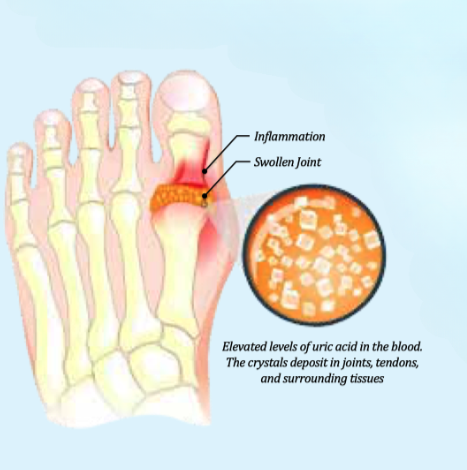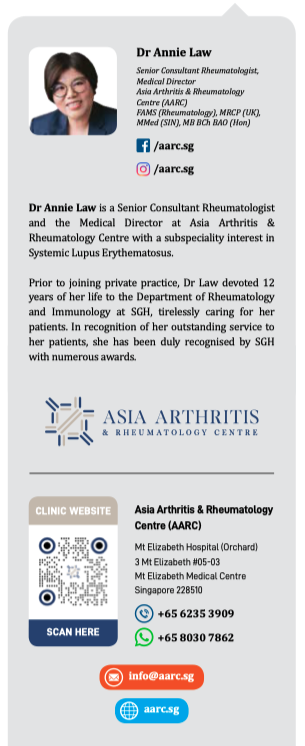When in Gout
The Beginner’s Guide To Gout: All You Need To Know About Preventing This Lifestyle Disease

Did you know that you can actually take concrete steps to lower your risk of developing the autoinflammatory disorder gout? While having a family history of gout does indeed predispose you to getting gout, leading a healthy lifestyle still makes a difference. In fact, gout was historically labelled as the “disease of kings” because a considerable number of affluent people who lead overly indulgent lifestyles suffer from gout. This, in part, explains gout’s relatively high prevalence in the first-world country Singapore, as according to a 2023 Frontiers in Medicine research article, about 4% of adults in Singapore are afflicted with this condition.
DEMYSTIFYING GOUT
Gout is a type of inflammatory arthritis that occurs when urate crystals accumulate in the joints. The condition is usually defined by sudden, intense attacks of pain, redness, swelling and joint tenderness. While gout predominantly targets the big toe, it can also affect various joints like the feet, ankles, knees, elbows, wrists and fingers. As a result, gout can cause severe pain, leading to limitation in movements In some instances, individuals may experience a low-grade fever during acute attacks accompanied by other systemic symptoms such as fatigue and malaise.
CAUSE AND POTENTIAL COMPLICATIONS
Gout is primarily caused by a buildup of uric acid in the blood, known as hyperuricaemia. Uric acid is a byproduct of the body’s breakdown of purines, which are naturally occurring substances found in the body and in many foods. When too little uric acid is removed or there is an overproduction of uric acid from excessive cell breakdown, uric acid accumulates and forms urate crystals in the joints and surrounding tissues. This crystal deposition in the joints can cause episodic joint inflammation known as a gout attack.
While elevated uric acid levels are a risk factor for gout, having high uric acid levels does not necessarily mean someone will develop gout. Other factors, such as genetics and lifestyle, play a role in the development of the condition.
Recurrent gout attacks or poorly controlled gout can cause joint damage and impaired quality of life. For severe chronic cases, collections of solid urate known as tophi may form in and around the joints, tissues such as the ears, tendons and soft tissues. Other possible complications include kidney stones and kidney damage. Gout is also associated with an increased risk of cardiovascular disease, diabetes and metabolic syndrome.
GUARDING AGAINST GOUT
Thankfully, there are some evidence-based ways to lower your risk of developing gout. Effectively preventing gout involves a holistic approach, incorporating dietary adjustments to reduce purine intake and maintaining healthy lifestyle habits to keep gout at bay.

Food Intake
1. FOOD INTAKE
- Minimise purine-rich foods: Adopt a diet that limits purine-rich foods, such as seafood, red meat and organ meats. These foods contribute to uric acid production, and reducing their intake helps to mitigate the risk of gout.
- Maintain a balanced diet: Embrace a balanced diet filled with plenty of fruits, vegetables, whole grains and low-fat dairy products. This not only supports overall health, but also aids in preventing gout by providing essential nutrients without contributing to excessive uric acid levels.
2. HYDRATION
- Limit alcohol intake: Beer and liquors are associated with an increased risk of gout. Avoid and limit alcohol intake as This is because alcohol consumption increases uric acid levels.
- Minimise beverages with high fructose content: Drinks containing high fructose corn syrup, like sugary carbonated drinks, fruit-flavoured beverages or pre-packaged juices, should be avoided. This is because they contribute to elevated uric acid levels, increasing the risk of gout.
- Opt for plain water and stay well-hydrated: Consume about 1.5 – 2L of fluid a day as it helps to flush out uric acid.
3. WEIGHT MAINTENANCE
- Eat in moderation: Stop eating when you are 70% full. Refrain from distracted and hurried eating as these habits make you more prone to overeating. Maintaining a healthy weight is key since obesity is a recognised risk factor for gout.
- Exercise regularly: Engage in at least 150 minutes of moderate-intensity exercise or 75 minutes of vigorousintensity physical activity per week to mitigate obesity. Be sure to exercise safely. For instance, be aware of your surroundings as physical trauma and joint injuries can sometimes trigger gout attacks in susceptible individuals.

4. MANAGEMENT OF OTHER CHRONIC CONDITIONS
- Schedule regular follow-up appointments with your doctor: It is imperative to monitor your other medical conditions, such as diabetes, high blood pressure, kidney disease and metabolic syndrome, since they can contribute to gout.
- Adhere to the recommended treatment plan: In order to control the aforementioned conditions, heed your doctor’s advice by, for example, taking the prescribed medication(s) on time and at the right dosage.
WHEN TO SEE A RHEUMATOLOGIST
Prevention is better than cure. Adopting a robust prevention plan to fight against gout is especially important for those with a high or borderline high level of uric acid in their blood, and people with a family history of gout. Elevated uric acid levels alone may not always indicate gout. However, when combined with symptoms or a history of gout attacks, they can be concerning. Consulting a rheumatologist, a doctor specialised in inflammatory and autoimmune conditions including gout, can be beneficial if one or more of the following points pertain to you:
- Recurrent Gout Attacks: If you have frequent and recurrent gout attacks, a rheumatologist can help assess your condition and provide targeted treatment plans.
- Joint Involvement: Gout typically affects the joints, and if you notice persistent joint pain, especially in the big toe or other joints, it is crucial to seek specialist care.
- High Uric Acid Level: If you have concerns or queries about high uric acid levels, a rheumatologist can assess your risk and provide a personalised preventive plan.

For bespoke advice regarding gout, you can seek help from Senior Consultant Rheumatologist Dr Annie Law. As the Medical Director of Asia Arthritis & Rheumatology Centre (AARC), Dr Law has extensive experience in treating patients with a multitude of autoimmune conditions. Her in-depth knowledge of gout makes her well-positioned to address your concerns effectively. In order to consult Dr Law, kindly contact AARC, a rheumatology specialist clinic conveniently located at Mt Elizabeth Orchard Hospital, Singapore.
SUMMARY
All in all, the risk of developing gout is not solely predetermined by genetics; lifestyle choices play a pivotal role in mitigating this autoinflammatory disorder. Taking control of one’s lifestyle choices can significantly contribute to reducing the risk of developing gout, as well as enhancing overall health and well-being. We recommend that individuals with goutrelated concerns consult a rheumatologist, so that they can get the specialised care that they deserve.













